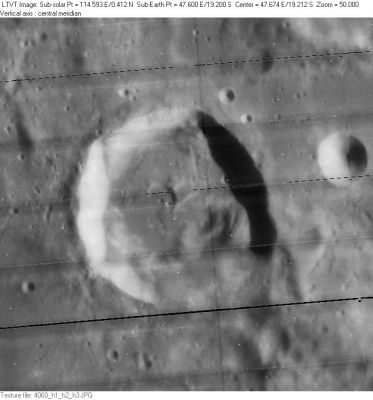Difference between revisions of "Monge"
| Line 22: | Line 22: | ||
* The shadows in LO-IV-160H indicate depths of 2550-2850 m. | * The shadows in LO-IV-160H indicate depths of 2550-2850 m. | ||
* Central peak height | * Central peak height | ||
| − | ** [[Sekiguchi%2C%201972|Sekiguchi, 1972]]: 1.0 km <span class="membersnap">- | + | ** [[Sekiguchi%2C%201972|Sekiguchi, 1972]]: 1.0 km <span class="membersnap">- fatastronomer</span> |
<br /> | <br /> | ||
==Nomenclature== | ==Nomenclature== | ||
Latest revision as of 21:26, 16 April 2018
Contents
Monge
| Lat: 19.2°S, Long: 47.6°E, Diam: 36 km, Depth: 1.54 km, Rükl: 59 |
LO-IV-060 The 9-km crater on the right is Cook G (and a small piece of Cook itself is visible in the extreme upper right).
Images
LPOD Photo Gallery Lunar Orbiter Images
Although there seem to be no orbital Apollo photographs in the LPI's list of Monge, this crater WAS photographed during the mission of Apollo 16. It (Monge) is noticeable on several south-looking oblique Fairchild camera frames such as AS16-M-0677. In this frame, Monge is noticeable near the central part of the curved horizon.
Research: Danny Caes.
Maps
(LAC zone 97B2) LAC map Geologic map
Description
Description: Wikipedia
Additional Information
Depth data from Kurt Fisher database
- Westfall, 2000: 1.54 km
- Viscardy, 1985: 2.6 km
- Cherrington, 1969: 2.59 km
- The shadows in LO-IV-160H indicate depths of 2550-2850 m.
- Central peak height
- Sekiguchi, 1972: 1.0 km - fatastronomer
Nomenclature
Gaspard; French mathematician (1746-1818).
LPOD Articles
Bibliography
